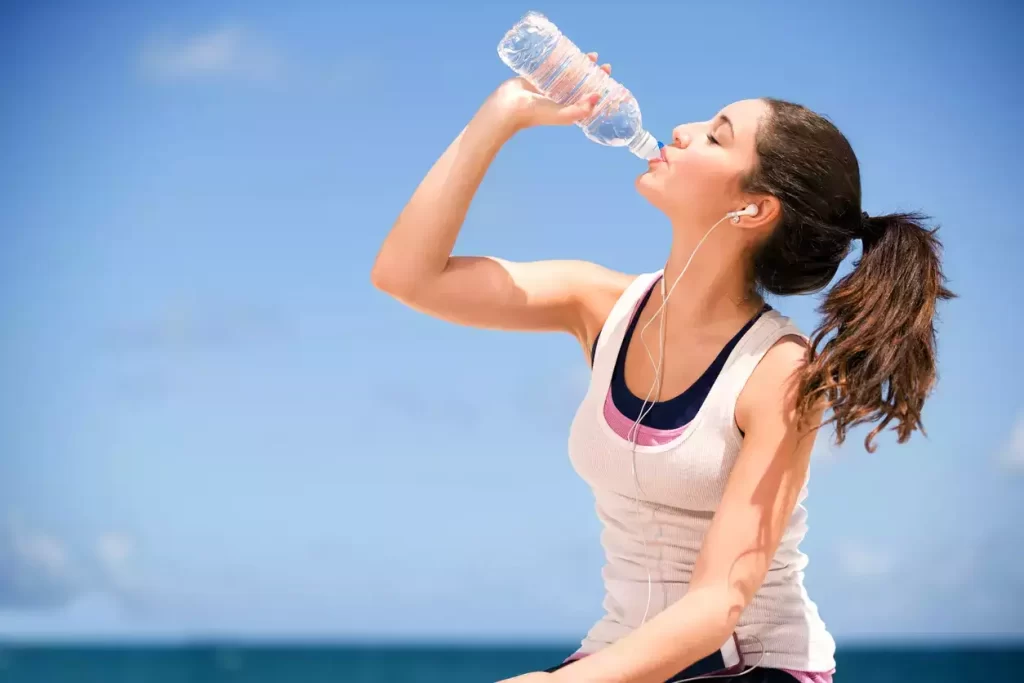Fluid ingestion replenishes your entire system, especially your skin. Like a nice shower or wash of vitamins, hydration is essential for healthy skin because it keeps blood flowing and brings oxygen to skin cells while washing away toxins that otherwise could become trapped inside our systems.
Keeping the skin well hydrated supporting its barrier function and reducing irritation and sensitivity and, at the same time, improving elasticity, fade fine lines and wrinkles, evening skin tone and assisting in the management of hyperpigmentation.
Maintains Moisture Levels
Hydration helps to keep your skin moist and prevent it from drying out, which keeps it more supple, smooth and healthy, thus giving you a brighter glow and overall healthier appearance.
Fully hydrated skin barriers offer more protection against external environmental contaminants and against extremes of climate, protecting against the symptoms of skin disease such as eczema and psoriasis.
But because your hydration needs will fluctuate with the climate in which you live, your level of activity and so on, drinking more water and applying hydrating skin-care products will increase the amount of hydration your body is seeking – as will eating fresh fruit and vegetables regularly. The old recommendation of eight 8-ounce glasses a day is, of course, a good general guideline, but your needs will be different – so let your body tell you by drinking when you’re thirsty.
Reduces Irritation and Sensitivity
The barrier layer helps to keep skin moist by preventing water from leaving the system through the stratum corneum, the natural skin barrier that is under your first or outer layer of skin. If the barrier is compromised, dryness, irritation can set in. Drinking enough water helps keep this barrier layer as healthy as possible which can help reduce symptoms and provide your skin with the best opportunity to stay healthy.
Additionally, water facilitates toxin elimination from the body, helps control excess oil production that contributes to the formation of blackheads and whiteheads, and aids in flushing blood for a better complexion and healthier skin.
Although skin hydration is very important in general skin health, it is by no means a magic bullet for all your skincare troubles. Dryness is a complex symptom, and seeking the advice of a dermatologist may be the best way for you to get a specific treatment plan or recommendations – including external hydration products, as well as specific treatments aimed at treating the root cause.
Reduces the Appearance of Fine Lines and Wrinkles
Proper hydration will improve the skin’s lipid barrier (the protective layer that helps to keep moisture in and toxins out), leading to the reduction of fine lines and wrinkles caused by dryness.
Water is the most convenient but the easiest and, therefore, the simplest way of keeping yourself hydrated. Eating food that can give you the water such as vegetables and fruit can also help in this matter.
Being hydrated would increase collagen production, shrink your pores and prevent the formation of fine lines and wrinkles. It also helps with puffiness and dullness while making your skin smoother with more bouncy texture.
Boosts Collagen Production
Research has shown that hydrated cells equal healthy skin cells. Anyone longer than five feet will attest to the simple fact that, if you don’t consume adequate water, your cells become compromised your skin becomes itchy, flaky, tight or dull. without the proper protection from the outer layer of cells, it is prone to fine lines and wrinkles.
In fact, moisturisation of cells is a basically important condition to stimulate natural collagen production. With full hydration, collagen cells have a plump look. On the other hand, when collagen cells are dehydrated, they begin to shrivel, looking like raisins. Over time, loss of elasticity or rigidity might cause skin to become finely line or wrinkled.
Maintaining skin hydration is easy. Drink plenty of water, eat water-rich foods (fruits and vegetables), limit caffeine intake, and use moisturisers with high concentrations of hydrating compounds.
Prevents Dehydration
Dehydration alone results from loss of body water along with electrolytes of several kinds. If loss is great (or our consumption of water and fluids is very poor) the results can be dehydration. There are effective ways to forestall such dehydration. These include drinking lots of fluids – especially, under normal circumstances, when ingesting an appropriate diet (especially fruits and vegetables high in moisture). Other dehydration-fighting strategies include keeping away from caffeinated beverages (eg, coffee, tea and coke) and those that contain added sugar.
Those athleticians and other people undertaking heavy exercise in hot and humid weather should consume additional fluids to replace enhanced sweat rate. For every two per cent of your total body water lost, there’s a feeling of fatigue, lowered motivation, and altered thermal regulation.
Then you can keep yourself well-hydrated by drinking water first thing in the morning, keeping a water bottle with you at all times and drinking fluids frequently throughout the day.


